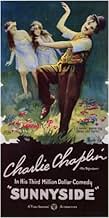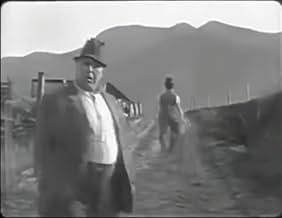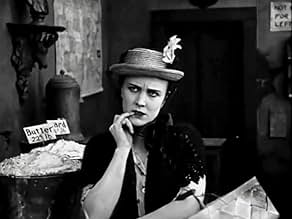Charlie works on a farm from 4am to late at night. He gets his food on the run (milking a cow into his coffee, holding an chicken over the frying pan to get fried eggs). He loves the neighbo... Read allCharlie works on a farm from 4am to late at night. He gets his food on the run (milking a cow into his coffee, holding an chicken over the frying pan to get fried eggs). He loves the neighbor's daughter Edna but is disliked by her father. He rides a cow into a stream and is kicke... Read allCharlie works on a farm from 4am to late at night. He gets his food on the run (milking a cow into his coffee, holding an chicken over the frying pan to get fried eggs). He loves the neighbor's daughter Edna but is disliked by her father. He rides a cow into a stream and is kicked off. Unconscious, he dreams of a nymph dance. Back in reality a city slicker is hurt in ... Read all
- Farm Handyman
- (as Charlie Chaplin)
- Nymph
- (uncredited)
- Slicker
- (uncredited)
- Villager and Edna's Father
- (uncredited)
- Small Role
- (uncredited)
- Nymph
- (uncredited)
- Nymph
- (uncredited)
- Small Role
- (uncredited)
- Small Role
- (uncredited)
- Small Role
- (uncredited)
- Small Role
- (uncredited)
- Fat Man
- (uncredited)
- Small Role
- (uncredited)
- Nymph
- (uncredited)
- Small Role
- (uncredited)
- Young Man from the City
- (uncredited)
- Fat Boy's Father
- (uncredited)
- Director
- Writer
- All cast & crew
- Production, box office & more at IMDbPro
Featured reviews
Chaplin had practically invented the narrative slapstick comedy, but here he belittles the storytelling aspects that were now a comedy standard, curtailing descriptions of characters and places with "etc, etc, etc" and using a title card to bluntly announce the romantic subplot. Throughout the picture he makes use of his now most clichéd plot devices – the abused employee, the sophisticated love rival, the "it-was-all-a-dream" revelation – and, of course, numerous examples of his stock slapstick manoeuvre, the kick up the arse.
And yet, it appears Chaplin was incapable of deliberately making a bad picture. There are plenty of decent gags here, especially those at the beginning where Charlie thwarts his employer's attempts to get him out of bed. And even at the height of his sarcasm and hyperbole it seems Chaplin cannot help but work in gags and sub-gags which are genuinely funny. And for all its narrative laziness, Sunnyside is actually strong in its visual storytelling, beginning with the iris on the church spire to set the tone, then opening up the iris to reveal an exquisitely balanced shot of the village. And even the rushed ending is among Chaplin's sweetest in its delicate imagery.
And there's more; the all important statistic – Number of kicks up the arse: 24 (2 for, 22 against – can this be a record?)
For all the good comedic work, one moment delivers a truly hilarious moment for me. Chaplin finally sees that he lost the cows and as he walks back to town, he double checks a man walking along the road. It's Chaplin making sure that the man isn't a cow. It's gloriously ridiculous and fun. The movie is mostly slapstick. Chaplin does do a Tramp imitation when he dresses in city garb. This may not be one of his iconic movies but it's a good second tier work.
In the film, the Tramp works overtime as a farmhand and employee of the adjoining hotel; his only solace being in his love for Edna Purviance's village belle. That sounds simple enough, but its construction and the fluency of the gags are off-kilter, as is the balance between slapstick and pathos. As a result, much of the hilarity and emotional involvement is forsaken.
Perhaps, "Sunnyside" was instructive for Chaplin. His subsequent films, especially "The Kid", would contain pathos and slapstick harmoniously. One may view the film as an experiment in this light. Furthermore, the dream sequence in "The Kid" is a more fully developed construction than that in "Sunnyside". The dancing nymphs interlude here in homage to ballet dancer and choreographer Vaslav Nijinsky might've worked better if placed in a better construction. Nevertheless, There are some funny moments here, as well as some hints at moments of poignancy. I especially liked the opening scenes where the Tramp won't get out of bed and brings a chicken and a cow into the kitchen to make breakfast. But, such moments are often lost within the ultimate hodgepodge that is "Sunnyside".
Did you know
- TriviaWhen the Farm Handyman (Charles Chaplin) drops the egg shell into the coffee pot, he is not simply surreptitiously disposing of the shell. Egg shells, being alkaline, decrease the bitterness of the coffee. This was a common practice for the time.
- GoofsIn the first scene, the Farm Handyman's (Charles Chaplin) boss gets up, puts his right shoe on, kicks sleeping Charlie awake, then goes back to bed. He gets up again to throw his other shoe at sleeping Charlie. The third time he gets up, he has both shoes on, even though he never retrieved the shoe he threw.
- Alternate versionsThere is an episode, preserved on the 2003 DVD, of Chaplin attempting to shave Albert Austin with hilarious results. This cut segment can also be seen in Unknown Chaplin (1983).
- ConnectionsFeatured in Charlie: The Life and Art of Charles Chaplin (2003)
Details
- Release date
- Country of origin
- Official sites
- Languages
- Also known as
- Sunnyside
- Filming locations
- Production company
- See more company credits at IMDbPro
- Runtime34 minutes
- Color
- Sound mix
- Aspect ratio
- 1.33 : 1
Contribute to this page





























